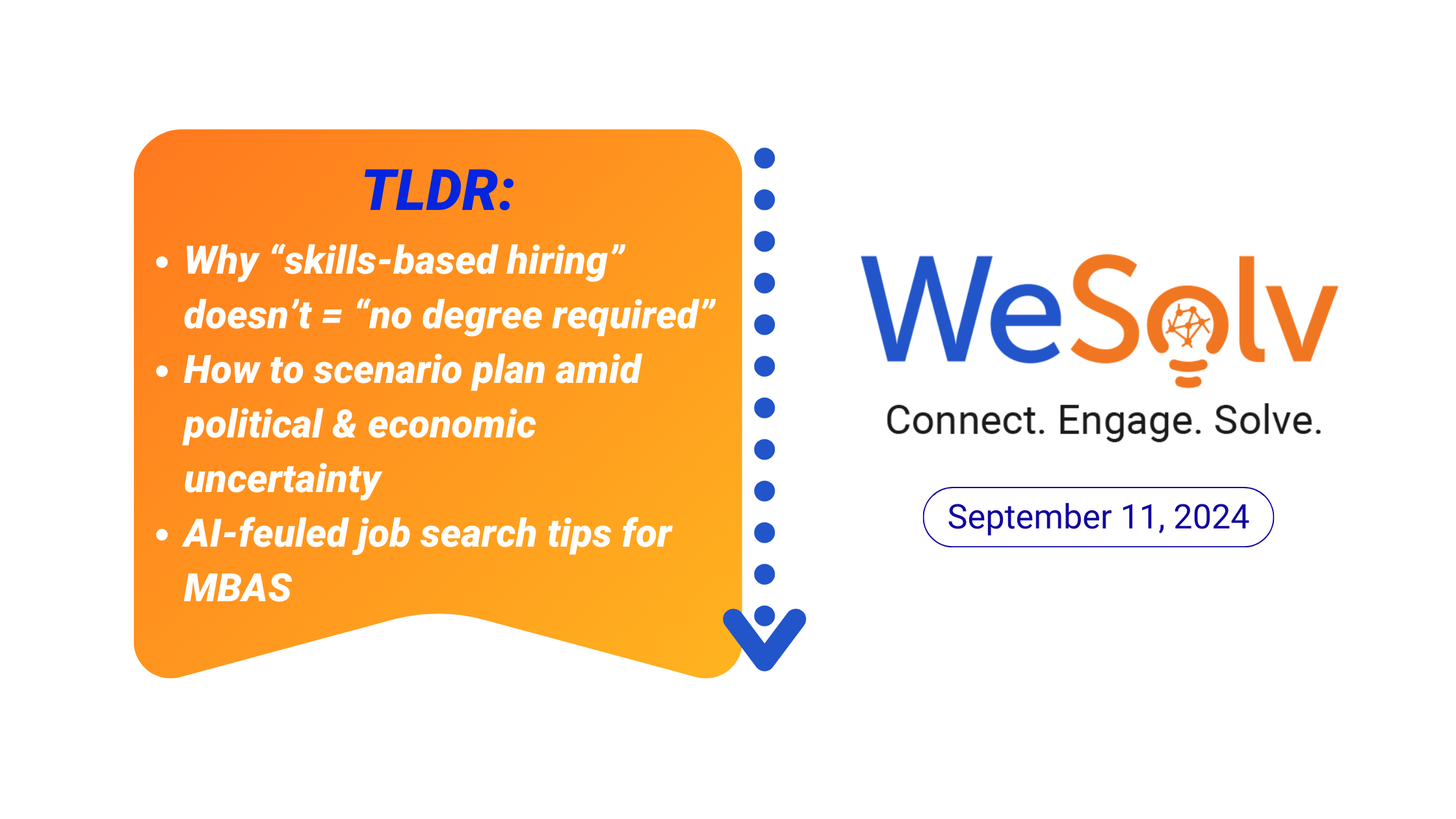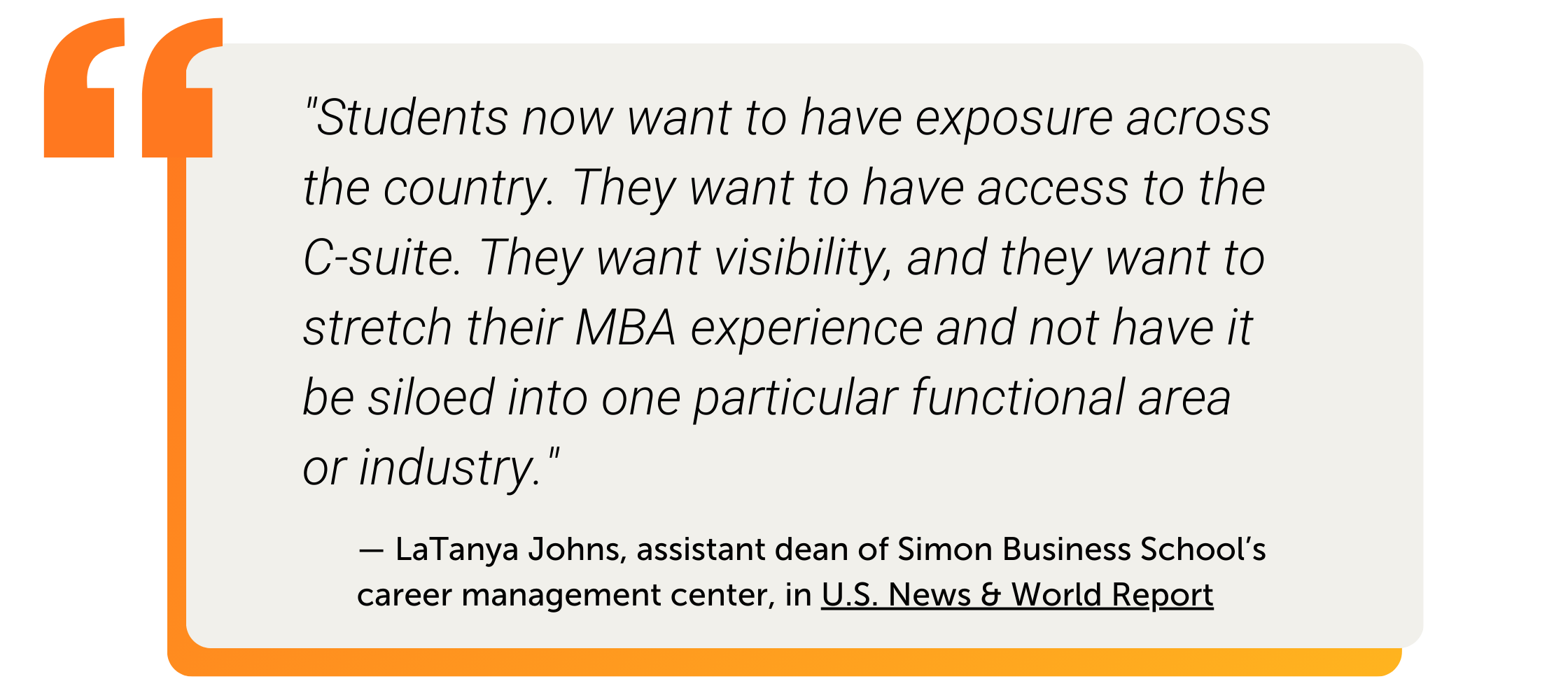Welcome to WeSolv’s monthly newsletter for our employer and university partners! Here, we’ll break down trending DEI x hiring news and equip you with the insights you need to support, attract, and hire talented underrepresented advanced degree candidates. Click here to receive these newsletters directly to your inbox each month.
Skills-based hiring is on the rise: 81% of employers say they’re using some form of skills-based hiring in 2024, up from 56% in 2022. And 94% say skills-based hiring is more predictive of on-the-job success than resumés.
That’s according to one 2024 report, which also found that employers with skills-based hiring strategies are seeing improved diversity and retention scores and lowered mis-hire and cost-to-hire rates.
But these wins don’t tell the full story. Despite the benefits, many organizations are struggling to successfully adopt skills-based hiring practices. As of February 2024, 45% of firms who’d made a commitment to skills-based hiring had yet to actualize any changes, and another 18% had “backslid” into old hiring patterns.
That’s a big problem when you consider that the need to evaluate candidates for their skills and, most importantly, for their potential is growing. With the rise of GenAI, past work experience, titles held, and keywords crammed onto a resumé all matter less. Hard skills have a shorter life expectancy, and hiring teams must show creativity in assessing what candidates can truly bring to a role.
I started WeSolv as a platform to help companies tap into a diverse, vetted talent pool of advanced degree candidates and find their best match using real projects (we call them Case Challenges). Meaning, tactical skills-based hiring solutions are something I’ve spent a lot of time with.
If you’re wondering how to start evaluating candidates based on their real, demonstrated skills + applied problem-solving abilities, you don’t need to reinvent the wheel. Get familiar with what has — and, just as importantly, hasn’t — worked for companies that have implemented these practices already.
Read on for some of the most common roadblocks we’ve seen organizations hit when attempting to make the switch to skills-based hiring, so that you can avoid these dead ends yourself. Then, keep reading for more hiring trends and news that impacts underrepresented MBA candidates & advanced degree seekers — and the companies that hope to hire them.
To getting skills-based hiring right,
Stella Ashaolu
CEO and Founder, WeSolv
 1. They see “skills-based hiring” and “no degree required” as synonymous.
1. They see “skills-based hiring” and “no degree required” as synonymous.
Let’s be clear: Dropping unnecessary degree requirements is a skills-based hiring best practice, and it removes a barrier for underrepresented talent, too. A 2023 Census Bureau report found these requirements auto-eliminate almost two-thirds of workers, with a disproportionate impact on Black and Latino workers.
That said, the belief that skills-based hiring starts and ends with degree requirements fails to transform hiring behaviors and ignores the fact this hiring practice is meant to benefit underrepresented advanced degree holders, too. Regardless of degrees obtained or not obtained, the idea is to bring in new recruitment & hiring measures that accurately assess the potential of all candidates — and not just to delete a line from job postings.
2. They use inadequate definitions of required skills.
If you’re going to hire “for skills,” you need to have clear, comprehensive definitions of the skills actually needed for each open role. Without precise definitions, hiring teams are forced to assess skills subjectively and/or haphazardly, leading to hiring decisions based on vague or inconsistent criteria.
Invest time in meticulously mapping out the skills required for each role, including proficiency levels and how they contribute to business objectives. And focus on the skills candidates will need within the first 6-to-12 months of a job, allowing room for on-the-job learning.
3. They believe bias can’t exist in skills assessments.
Some people hear “skills-based hiring” and assume it = objective by default. But even in a skills-based model, bias can infiltrate the assessment process. For example, if assessments are designed or administered in ways that favor certain groups, they won’t provide an equitable evaluation of all candidates.
Regularly review and adjust assessment tools to minimize bias, ensuring they’re fair, transparent, and inclusive. Consider using blind skills assessments where possible, and transparently share your selection criteria to help candidates understand what they’re being scored on.
4. They ignore the role of external talent ecosystems.
We mentioned not reinventing the wheel earlier. To that end: Don’t forget to consider how external talent ecosystems — like educational institutions, certification bodies, industry networks, and online skills marketplaces — can support, or hinder, your efforts. These are precisely the groups that should give you access to a broader and more diverse talent pool, too.
Build strong relationships with the right external talent ecosystems (like WeSolv!) to ensure a steady pipeline of candidates with the skills your organization needs.
Read our blog on skills-based hiring mistakes for more common roadblocks to avoid.
———————————————————-

———————————————————–

- 51%. That’s the ratio of women enrolled in Duke University’s Fuqua School of Business for its MBA Class of 2026, representing the first time the program has reached gender parity. (More.)
- AI risks get real. A new survey of Fortune 500 companies found the number of orgs citing AI as a risk factor rose by a whopping 473.5% compared to last year. But concern isn’t equal across industries. (More.)
- MBA > CPA. At least for CFOs. As of August, 51% of Fortune 500 and S&P 500 CFOs hold MBAs vs 38% with CPA credentials. It’s a gap that’s growing wider, and it signals a sea change in the financial leadership landscape. (More.)
- No more “suffering in silence.” That’s per Wharton MBA John Costa, a first-gen college grad whose story took off after he shared he’s been jobless for a year: “It’s not just the students from a non-traditional background or first-gen or low-income background who need to be wary. I think all students need to…have a Plan B.” (More.)
- An ERG rebrand. That’s currently underway at a wide slate of companies, including orgs, like Harley-Davidson and John Deere, that are ending or walking back DEI commitments in response to politicized pressure. This change to ERGs may not be the win some anti-DEI pundits think it is, though. (More.)
———————————————————————————–

- Scenario Planning Amidst Economic and Political Uncertainty. That’s the focus of our upcoming roundtable (Oct. 17th, 2-3pm ET) for CEOs, DEI leaders, and department heads who recognize that election years impact the workforce. Join us for this free, off-the-record convo about strategic planning, talent and leadership resilience, and more come November.
- Effective Budgeting for MBA Recruitment Amidst Salary Increases, with advice for company leaders who hope to maximize ROI while attracting top-tier talent.
- How Universities Can Proactively Diversify Recruiting Companies, with tactical strategies for outreach and a step-by-step action plan.
- AI-Powered Job Search Tips For MBAs that’ll take help candidates from application to offer.


